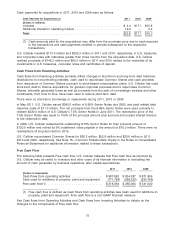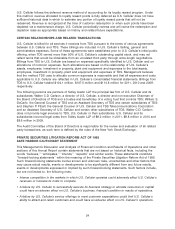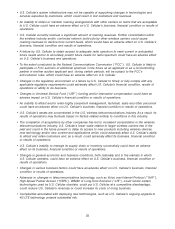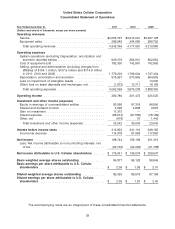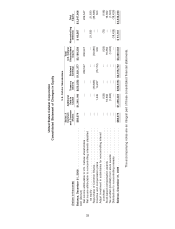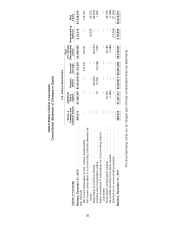US Cellular 2011 Annual Report Download - page 33
Download and view the complete annual report
Please find page 33 of the 2011 US Cellular annual report below. You can navigate through the pages in the report by either clicking on the pages listed below, or by using the keyword search tool below to find specific information within the annual report.•U.S. Cellular’s system infrastructure may not be capable of supporting changes in technologies and
services expected by customers, which could result in lost customers and revenues.
•An inability to obtain or maintain roaming arrangements with other carriers on terms that are acceptable
to U.S. Cellular could have an adverse effect on U.S. Cellular’s business, financial condition or results of
operations.
•U.S. Cellular currently receives a significant amount of roaming revenues. Further consolidation within
the wireless industry and/or continued network build-outs by other wireless carriers could cause
roaming revenues to decline from current levels, which would have an adverse effect on U.S. Cellular’s
business, financial condition and results of operations.
•A failure by U.S. Cellular to obtain access to adequate radio spectrum to meet current or anticipated
future needs and/or to accurately predict future needs for radio spectrum could have an adverse effect
on U.S. Cellular’s business and operations.
•To the extent conducted by the Federal Communications Commission (‘‘FCC’’), U.S. Cellular is likely to
participate in FCC auctions of additional spectrum in the future as an applicant or as a noncontrolling
partner in another auction applicant and, during certain periods, will be subject to the FCC’s
anti-collusion rules, which could have an adverse effect on U.S. Cellular.
•Changes in the regulatory environment or a failure by U.S. Cellular to timely or fully comply with any
applicable regulatory requirements could adversely affect U.S. Cellular’s financial condition, results of
operations or ability to do business.
•Changes in Universal Service Fund (‘‘USF’’) funding and/or intercarrier compensation could have an
adverse impact on U.S. Cellular’s financial condition or results of operations.
•An inability to attract and/or retain highly competent management, technical, sales and other personnel
could have an adverse effect on U.S. Cellular’s business, financial condition or results of operations.
•U.S. Cellular’s assets are concentrated in the U.S. wireless telecommunications industry. As a result, its
results of operations may fluctuate based on factors related entirely to conditions in this industry.
•The completion of acquisitions by other companies has led to increased consolidation in the wireless
telecommunications industry. U.S. Cellular’s lower scale relative to larger wireless carriers has in the
past and could in the future prevent or delay its access to new products including wireless devices,
new technology and/or new content and applications which could adversely affect U.S. Cellular’s ability
to attract and retain customers and, as a result, could adversely affect its business, financial condition
or results of operations.
•U.S. Cellular’s inability to manage its supply chain or inventory successfully could have an adverse
effect on its business, financial condition or results of operations.
•Changes in general economic and business conditions, both nationally and in the markets in which
U.S. Cellular operates, could have an adverse effect on U.S. Cellular’s business, financial condition or
results of operations.
•Changes in various business factors could have an adverse effect on U.S. Cellular’s business, financial
condition or results of operations.
•Advances or changes in telecommunications technology, such as Voice over Internet Protocol (‘‘VoIP’’),
High-Speed Packet Access (‘‘HSPA’’), WiMAX or Long-Term Evolution (‘‘LTE’’), could render certain
technologies used by U.S. Cellular obsolete, could put U.S. Cellular at a competitive disadvantage,
could reduce U.S. Cellular’s revenues or could increase its costs of doing business.
•Complexities associated with deploying new technologies, such as U.S. Cellular’s ongoing upgrade to
4G LTE technology, present substantial risk.
25


